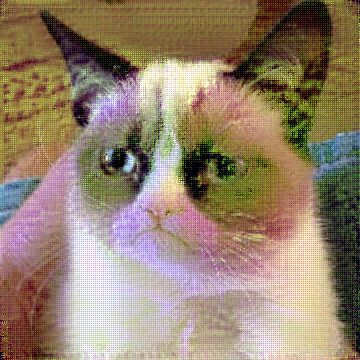Demonstrates iterative FGSM on Apple's NeuralHash model.
TL;DR: It is possible to apply noise to CSAM images and make them look like regular images to the NeuralHash model. The noise does degrade the CSAM image (see samples). But this was achieved without tuning learning rate and there are more refined attacks available too.
Here is an example that uses a Grumpy Cat image in place of a CSAM image. The attack adds noise to the Grumpy Cat image and makes the model see it as a Doge image.
As a result, both of these images have the same neural hash of 11d9b097ac960bd2c6c131fa, computed via ONNX Runtime, with the script by AsuharietYgvar/AppleNeuralHash2ONNX.
More generally, because the attack optimizes the model output, the adversarial image will generate largely the same hash as the good image, regardless of the seed.
Obtain the ONNX model from AsuharietYgvar/AppleNeuralHash2ONNX. You should have a path to a model.onnx file.
Then convert the ONNX model to a Tensorflow model by first installing the onnx_tf library via onnx/onnx-tensorflow. Then run the following:
python3 convert.py -o /path/to/model.onnxThis will save a Tensorflow model to the current directory as model.pb.
Finally, run the adversarial attack with the following:
python3 nnhash_attack.py --seed /path/to/neuralhash_128x96_seed1.datOther arguments:
-m Path to Tensorflow model (defaults to "model.pb")
--good Path to good image (defaults to "samples/doge.png")
--bad Path to bad image (defaults to "samples/grumpy_cat.png")
--lr Learning rate (defaults to 3e-1)
--save_every Save every interval (defaults to 2000)This will save generated images to samples/iteration_{i}.png.
Note that the hash similarity may decrease initially before increasing again.
Also, for the sample images and with default parameters, the hash was identical after 28000 iterations.
Terminal output:
# Some Tensorflow boilerplate...
Iteration #2000: L2-loss=134688, Hash Similarity=0.2916666666666667
Good Hash: 11d9b097ac960bd2c6c131fa
Bad Hash : 20f1089728150af2ca2de49a
Saving image to samples/iteration2000.png...
Iteration #4000: L2-loss=32605, Hash Similarity=0.41666666666666677
Good Hash: 11d9b097ac960bd2c6c131fa
Bad Hash : 20d9b097ac170ad2cfe170da
Saving image to samples/iteration4000.png...
Iteration #6000: L2-loss=18547, Hash Similarity=0.4166666666666667
Good Hash: 11d9b097ac960bd2c6c131fa
Bad Hash : 20d9b097ac170ad2c7c1f0de
Saving image to samples/iteration6000.png...- KhaosT/nhcalc for uncovering NeuralHash private API.
- Tencent/TNN for compiled Core ML to ONNX script.
- AsuharietYgvar/AppleNeuralHash2ONNX for instructions to extract ONNX model
- onnx/onnx-tensorflow for converting ONNX model to Tensorflow model
- Gist by unrealwill that suggested a similar attack

